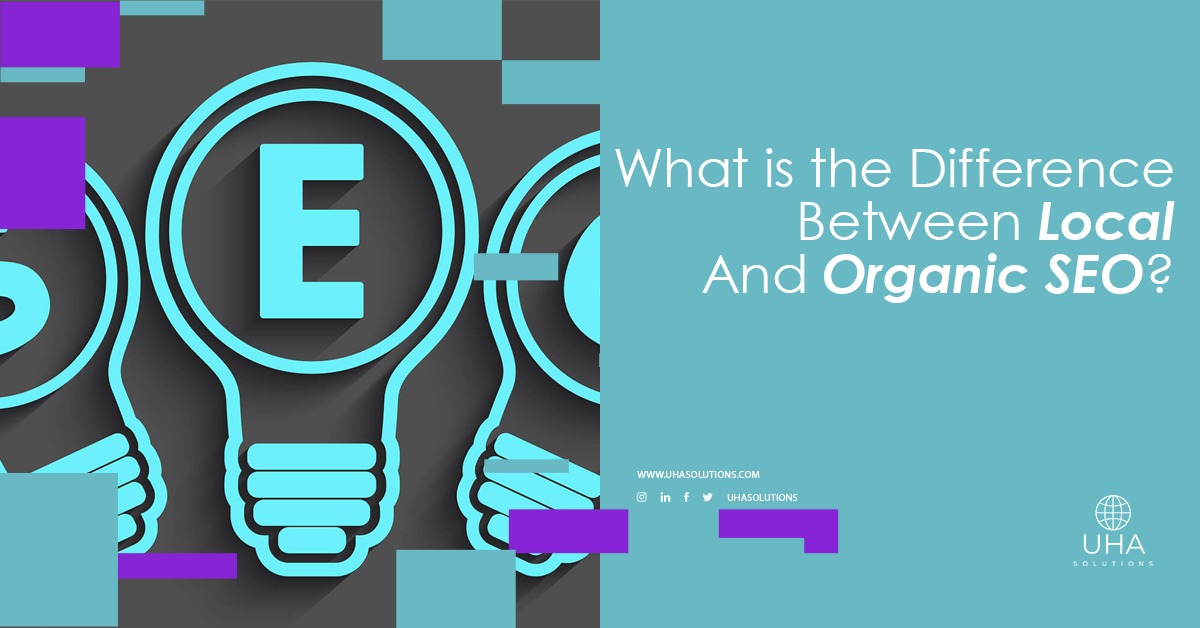Have you ever searched for a product or service online and noticed the same websites always appear at the top of the results?
It’s not by accident! Those businesses are likely utilizing smart digital strategies, such as local SEO or organic SEO, to enhance their visibility.
At first glance, these two SEO methods might seem similar, but they serve very different goals.
- Local SEO helps businesses appear in search results for nearby users, such as searches like “pizza near me” or “grocery shop near me.”
- Organic SEO, on the other hand, focuses on improving a website’s content, authority, and overall visibility to reach a broader (often global) audience.
Whether you’re building a new website or looking to enhance an existing one, understanding the distinctions between local and organic SEO is crucial to expanding your online presence.
In this blog, we’ll break down how each strategy works, when to use them, and how to decide which one is right for your business.
What Is Local SEO and How Does It Work?
Local SEO helps businesses appear in search results when nearby users search for products or services, making it easier for local customers to discover and visit them.
It’s especially valuable for businesses that rely on foot traffic or serve a specific geographic area, such as restaurants, clinics, or retail shops.
For example, when someone searches for “fast food restaurants near me,” Google uses their location to display the most relevant local options through its Local Pack (map listings).
These users often have strong purchase intent. They’re ready to take action, check reviews, and visit a business soon after searching.
By optimizing for local SEO, you can improve their visibility within their community, build trust, and turn local searches into real-world customers.
What Is Organic SEO and Why Is It Important?
Search engines like Google rank webpages based on several factors, including page speed, keyword relevance, content quality, backlink profile, and domain authority.
The better your website performs in these areas, the more likely it is to appear at the top of search engine results pages (SERPs).
When a user enters a query, Google’s algorithm analyzes millions of pages to determine which results best match the search intent.
If your website is optimized effectively, it has a greater chance of ranking higher, leading to more clicks, traffic, and potential customers.
Organic SEO is essential for long-term growth because it builds sustainable visibility, trust, and authority without relying on paid ads.
Key Differences Between Local and Organic SEO
| Local SEO | Organic SEO |
| It concentrates on targeting specific geographical areas. |
It targets a global or nongeographical audience. |
| It depends on having the same name, address, and phone number across the internet. | It depends on the types of keywords you use for your content, backlinks, and domain authority. |
| It helps businesses with location-based searches, for example, “coffee shop near me.” | It addresses a wide range of questions from users, for example, how to brew coffee |
| The most common key tool used in local SEO is Google My Business. | Key tools used for organic SEO are content marketing and technical SEO. |
When Should You Focus on Local SEO?
If your business relies on local foot traffic or serves a specific neighborhood or city, local SEO isn’t just a nice-to-have; it’s a must.
Let’s say you run a bakery, a dental clinic, or even a home repair service.
When someone nearby searches for “bakery near me” or “emergency plumber,” you want your business to show up, not your competitor’s. That’s exactly what local SEO helps you do.
Here’s when focusing on local SEO makes the most sense:
- You have a physical location where customers can visit you.
- You serve a particular geographic area and want to be visible in local searches.
- Want your business to appear in Google Maps and the local pack?
- Your competitors are showing up in search results, and you’re not.
- You’re trying to build trust with people in your area and turn online searches into in-person visits.
If your customers are nearby and your business success depends on them finding you easily, local SEO is where your focus should be. It’s targeted, effective, and one of the best ways to connect with the people right outside your door.
Local vs. Organic SEO: Which One Is Right for Your Business?
The type of SEO service you need depends on your business model and target audience. While both boost visibility.
Choose local SEO if:
- If you are planning to operate a physical business, such as a clinic or salon
- If you want to attract local customers
- Your success depends on having a favorable Google My Business profile, positive reviews, and correct contact information.
Choose organic SEO if:
- If you plan to reach a global audience for products or services,
- Your SEO strategy depends upon content marketing, such as blogs and service pages.
- You don’t sell your service or product in a specific location.
Many businesses utilize both types of SEO; for instance, local bakeries use local SEO to attract nearby customers while also using organic SEO to share recipes and upload content related to food items.
How Google Ranks Local and Organic Results Differently?
Google analyzes the local and organic search rankings differently according to its criteria.
Local SEO focuses on your business’s location, how easily users can find it, and the accuracy of your Google My Business profile.
Customer feedback and backlinks also play a significant role in local rankings, helping nearby customers locate your business.
For organic SEO, Google evaluates content quality and the overall speed of the website.
Additionally, it verifies that your page addresses the user’s query and includes backlinks from reputable sources.
The primary difference between the two is that organic SEO targets a broader global audience for increased visibility, while local SEO focuses on serving nearby customers.
Choosing the Right SEO Strategy for Long-Term Growth
A sustainable SEO strategy with long-term growth is vital for your website. It means you will attract more traffic, customers, and sales.
- Understand your Audience: First, you must understand your audience. Your audience shapes your SEO strategy, and according to them, you will use relevant keywords and structure your content, which will also improve your ranking in search engines.
- Ongoing SEO Tracking and Improvement: Continuous monitoring of SEO strategies for your website traffic is crucial for your business; it’s essential to stay on track and estimate your desired results. SEO provides you with various types of data, including organic traffic, keyword rankings, and backlinks.
- Building Trust With Customer Reviews: If customers regularly write reviews on your website, it also helps with ranking. Each review is unique, keeping your site relevant and up-to-date. This constant flow of new information from the customers tells search engines that your website is active and relevant, which can help boost your rating over time.
If your website link is not on the first page of the search results, you will not grow, which is why a long-term SEO strategy is essential to boost your ranking and improve the user experience.
Bottomline
At the end of the day, whether you need local SEO, organic SEO, or both comes down to one thing: who you’re trying to reach.
If your customers are nearby and ready to walk through your door, local SEO helps them find you.
If you’re aiming for a wider audience online, organic SEO builds your long-term visibility.
The smartest move? Know your audience, stay consistent with your strategy, and optimize for the way real people search.






